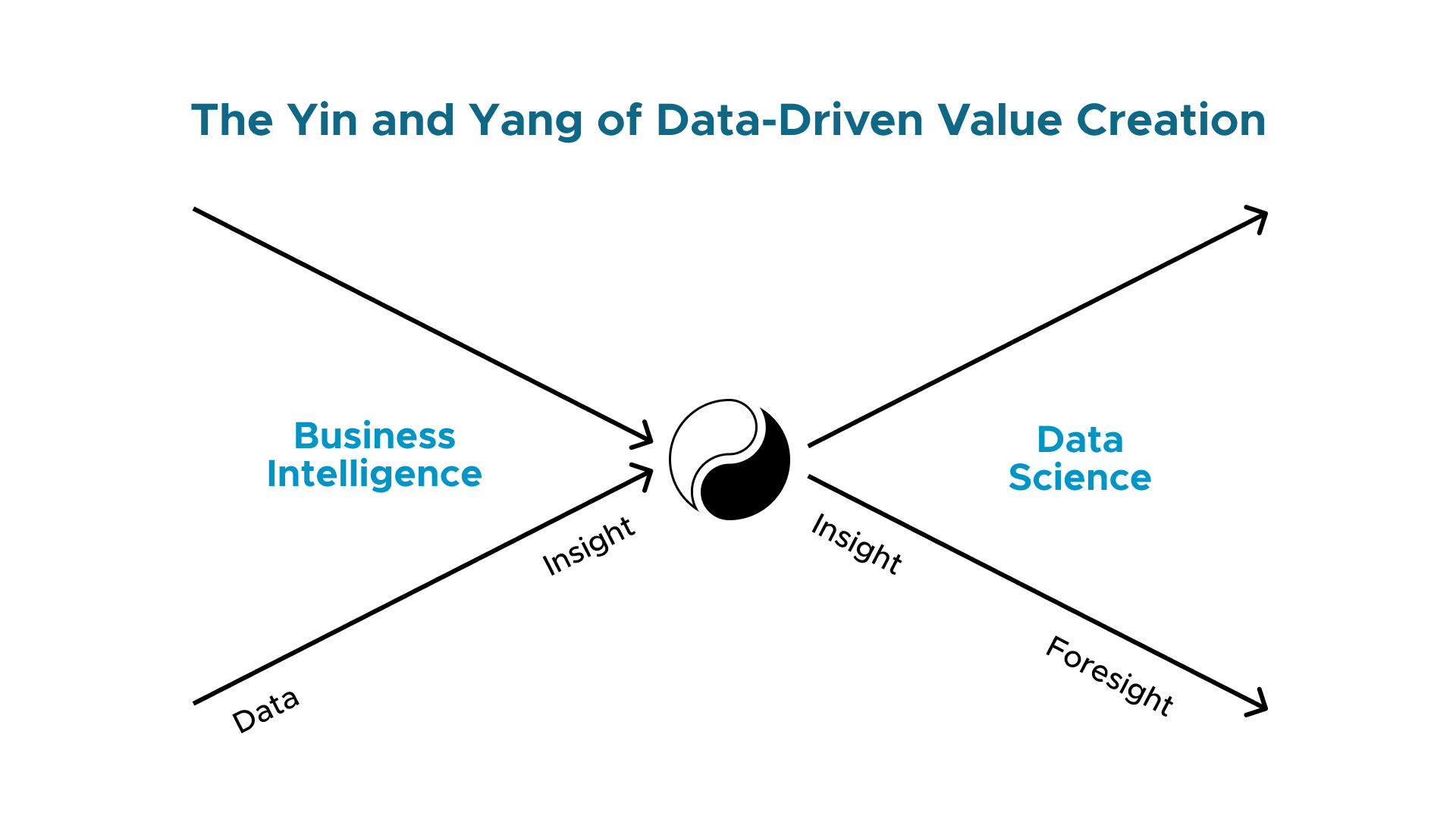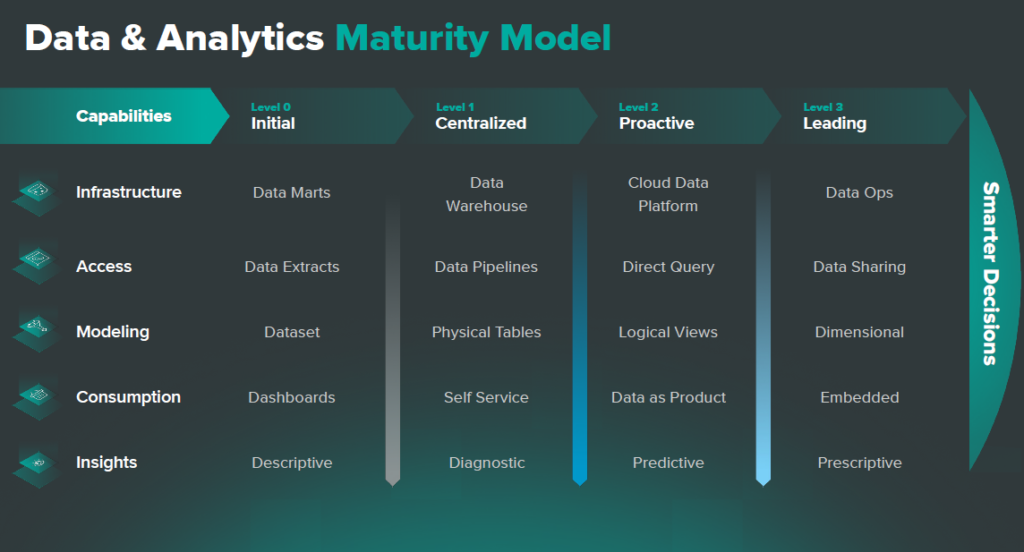
Many organizations still view machine learning and big data analytics through a technical prism. Business leaders know that the fundamental value proposition of these methodologies is in achieving better business outcomes.
I had the pleasure to discuss this topic with some of the best minds in the industry: Juan Gorricho, VP of Global Data & Business Intelligence at Visa; Ram Kumar, Chief Data and Analytics Officer at Cigna; Greg Coquillo, AI Technology Manager at Amazon; and Aruna Pattam, Head of AI and Data Science at HCL.
After reading this post, be sure to check out our data leader panel to learn directly from them about these topics in more detail.
The Data and Analytics Maturity Model
Before diving into the topics discussed with the panelists, let’s start with some context. The Data & Analytics Maturity Model is a way to assess and chart your organization’s competency along the data analytics maturity curve. As organizations advance from left to right in the model with technologies they’ve implemented and analytics methodologies, they empower their teams to make better decisions for their business.

What is Required to Create Business Value Using AI-Driven Data Insights?
One thing that stood out from conversations with Ram Kumar is that the reason companies should embrace AI is to fundamentally change the value propositions for customers, partners, and the communities they serve. This isn’t just about getting technology in place. Getting there requires the cultural change that comes with full-scale digital transformation. The onset of the COVID pandemic has only escalated organizations’ need to become data-driven. Establishing better competency in AI and ML-driven data analytics is the cornerstone of becoming a data-driven organization.
We also discussed the importance of accountability at the top that goes beyond traditional project sponsorship. The business needs to treat data as a strategic and competitive asset and consider how the lifecycle of the data influences its usage. Digital transformation, especially in data analytics, requires that companies embrace failure as a critical cog in experimentation and learning. As with any science, data science excellence requires continual experimentation.
Another big takeaway was the importance of having a data and analytics vision built on democratized and intelligent data-driven insights. People, processes, culture, technology, and data are the pillars and critical enablers of this vision, providing the inputs into the data lifecycle that yield outcomes that drive value creation. That means that while we acknowledge the importance of the technical tools and processes that gather and analyze our data, we must make sure that digital information is accessible to the business and not just scientists and engineers. These shifts can create competitive advantages for companies and lead to more affordable, simple, and predictable services for customers and partners.
Considerations for Bringing AI into Business Decision Making
As AI becomes more ubiquitous, we see many more organizations embracing its potential to help their businesses make decisions, predict potential issues, and drive customer experiences. With that momentum comes considerable pressure for C suite executives to deliver and scale AI adoption in their organizations. Our panel will discuss the critical considerations for companies looking to adopt and scale AI in their organizations.
It starts with defining ROI and identifying the business challenges AI can help your company overcome. The next consideration is the data. We’ve all heard the phrase “garbage in, garbage out.” Today’s companies create a plethora of potentially valuable data in their everyday work and transactions, but if the data isn’t computable, it will severely limit its efficacy.
Next is talent. Embracing AI goes beyond systems and tooling. Companies need the right talent to operate their AI systems and the business experts to inform relevant models and draw the correct conclusions from the available data. In order to make AI really work for an organization, the data science and business teams need to work together to make sure AI investments will pay off for the business.
Another critical consideration is MLOPS. Up to 80% of ML models never make it into production. Models that sit on the shelf can’t deliver business value. Factors like infrastructure and rigorous testing requirements must be considered to ensure all that complex work ends up in production to help the business.
Connecting AI and BI Projects to Business Goals
I had the opportunity to speak with one of our panelists, Greg Coquillo, about the importance of data literacy and linking business KPIs to AI and BI projects. It starts with creating a culture of data literacy, which again begins with accountability at the top and proliferates down to every level of the organization.
An excellent first step towards data literacy is assessing the company’s current maturity level and identifying areas for advancement and improvement. Organizations with a data-driven culture can then start to think about their business KPIs in the context of their AI and BI projects.
Another key takeaway from our talk was the importance of prioritization and metrics for business KPIs. Business leaders understand the factors most important to their success in a given period. KPIs should be ranked accordingly and assigned measurable metrics that include leading indicators to demonstrate whether an initiative is heading towards success.
Learn More From These Industry Leaders
Our webinar features leaders from Visa, Cigna, Amazon, and HCL Technologies discussing how they leverage AI & BI to accelerate business outcomes in their organizations. Our panelists are industry leaders, sharing their practical insights and guidance on closing gaps between data science and BI teams and combining predictive and descriptive analytics to empower decision-makers.
We also discuss implementing the right processes and tools to democratize data and help every individual utilize data through self-service analytics. If you are an AI, BI, or data leader or want to hear directly from these industry experts, be sure to check out the webinar.


SHARE
RESEARCH REPORT